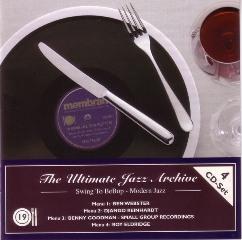The Ultimate Jazz Archive Vol.73 – Ben Webster [1932-1944] [2005]
The Ultimate Jazz Archive Vol.73 – Ben Webster [1932-1944] [2005]

01.The Blue Room 02.New Orleans 03.Milenberg Joys 04.Lafayette 05.Rug Cutter’s Swing 06.Dream Lullaby 07.Tea For Two 08.Early Session Hop 09.Cotton Tail 10.Linger Awhile 11.Raincheck 12.Perdido 13.Woke Up Clipped 14.After You’ve Gone 15.Sleep 16.Memories Of You 17.Just A Riff 18.Blues Skies 19.Kat’s Fur 20.I Surrender Dear
Ben Webster was considered one of the "big three" of swing tenors along with Coleman Hawkins (his main influence) and Lester Young. He had a tough, raspy, and brutal tone on stomps (with his own distinctive growls) yet on ballads he would turn into a pussy cat and play with warmth and sentiment. After violin lessons as a child, Webster learned how to play rudimentary piano (his neighbor Pete Johnson taught him to play blues). But after Budd Johnson showed him some basics on the saxophone, Webster played sax in the Young Family Band (which at the time included Lester Young). He had stints with Jap Allen and Blanche Calloway (making his recording debut with the latter) before joining Bennie Moten's Orchestra in time to be one of the stars on a classic session in 1932. Webster spent time with quite a few orchestras in the 1930s (including Andy Kirk, Fletcher Henderson in 1934, Benny Carter, Willie Bryant, Cab Calloway, and the short-lived Teddy Wilson big band).
In 1940 (after short stints in 1935 and 1936), Ben Webster became Duke Ellington's first major tenor soloist. During the next three years he was on many famous recordings, including "Cotton Tail" (which in addition to his memorable solo had a saxophone ensemble arranged by Webster) and "All Too Soon." After leaving Ellington in 1943 (he would return for a time in 1948-1949), Webster worked on 52nd Street; recorded frequently as both a leader and a sideman; had short periods with Raymond Scott, John Kirby, and Sid Catlett; and toured with Jazz at the Philharmonic during several seasons in the 1950s. Although his sound was considered out-of-style by that decade, Webster's work on ballads became quite popular and Norman Granz recorded him on many memorable sessions. Webster recorded a classic set with Art Tatum and generally worked steadily, but in 1964 he moved permanently to Copenhagen where he played when he pleased during his last decade. Although not all that flexible, Webster could swing with the best and his tone was a later influence on such diverse players as Archie Shepp, Lew Tabackin, Scott Hamilton, and Bennie Wallace. ---Scott Yanow, Rovi
download:
uploaded yandex 4shared mediafire mega solidfiles zalivalka cloudmailru filecloudio anonfiles oboom
Zmieniony (Piątek, 19 Wrzesień 2014 17:06)








